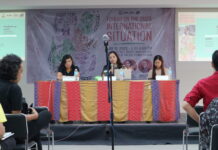“The regime is setting the stage for all-out suppression of democratic rights using ‘anti-terrorism’ as pretext.
MANILA – On its 52nd anniversary, the Communist Party of the Philippines slammed the Anti-Terrorism Council for designating the revolutionary group and the New People’s Army (NPA) as terrorist organizations.
In a statement sent to the media, the CPP rejected the label, saying the ATC’s move “is a precursor for heightened fascist suppression against the broad democratic forces which are being red-baited and persecuted for fighting Duterte’s tyrannical rule and schemes to perpetuate the Duterte political dynasty.”
“The regime is setting the stage for all-out suppression of democratic rights using ‘anti-terrorism’ as pretext,” the CPP added.
In a resolution Dec. 9, the ATC states that there is probable cause that the CPP-NPA committed acts defined as terrorism under the Anti-Terrorism Act.
The CPP said they [CPP and NPA] are not terrorist organizations but revolutionary groups fighting for the national and democratic interests of the Filipino people.
The CPP further said that as a revolutionary group, it has a belligerent status recognized by various countries and international organizations.
The CPP belied ATC’s claims, saying that the CPP and NPA are not listed as terrorist by Australia and United Kingdom. Under the Anti-Terrorism Act, the ATC can adopt the terrorist proscription by foreign countries if there is a request for designation coming from these jurisdictions. The CPP said that the ATC’s resolution does not cite any request from the United States, New Zealand or the European Union.
Rebellion different from terrorism
In an online webinar hosted by Kapayapaan, Dec. 26, former National Democratic Front negotiator Satur Ocampo pointed out that rebellion is different from terrorism.
Citing the opinion of former Supreme Court Associate Justice Antonio T. Carpio, Ocampo said the CPP and NPA cannot be designated as terrorists under the ATA.
In his opinion piece published by the Philippine Daily Inquirer July 15, Carpio pointed out that the ATA removed “rebellion” as a predicate crime of “terrorism.” The crime of terrorism in the ATA, Carpio said, is now a separate and distinct stand-alone crime, unlike in the Human Security Act, which the ATA amended, where the predicate crimes like rebellion and coup d’etat, were the means of committing the crime of terrorism.
In the same webinar, lawyer VJ Topacio, whose parents NDFP consultants Eugenia Magpantay and Agaton Topacio were killed by state security forces, said that the ATC’s designation has no basis whatsoever.
Topacio maintained that historically, the Government of the Republic of the Philippines (GRP) faced the NDFP in the negotiating table and reached numerous agreements. “Government would not engage with a terrorist group, and come up with agreements,” he said.
Topacio feared that the ATC’s resolution would pave the way for more attacks on human rights defenders who have been red-tagged by Duterte’s anti-communism task force.
NDFP peace consultant Rafael Baylosis said the ATC’s terror tagging as well as the ATA are hindrances to the resumption of peace talks and would never resolve the roots of the armed conflict.
The ATC is the body tasked under the law to designate any individual or group as a terrorist, following the guidelines set by the United Nations Security Council.
Under the ATA, only the Court of Appeals can order the proscription. The council’s designation would not mean automatic arrest or detention, but would prompt the council to request the Anti-Money Laundering Council to freeze the accounts and assets of the designated terrorists.
Originally published on Bulatat, December 26, 2020.


















